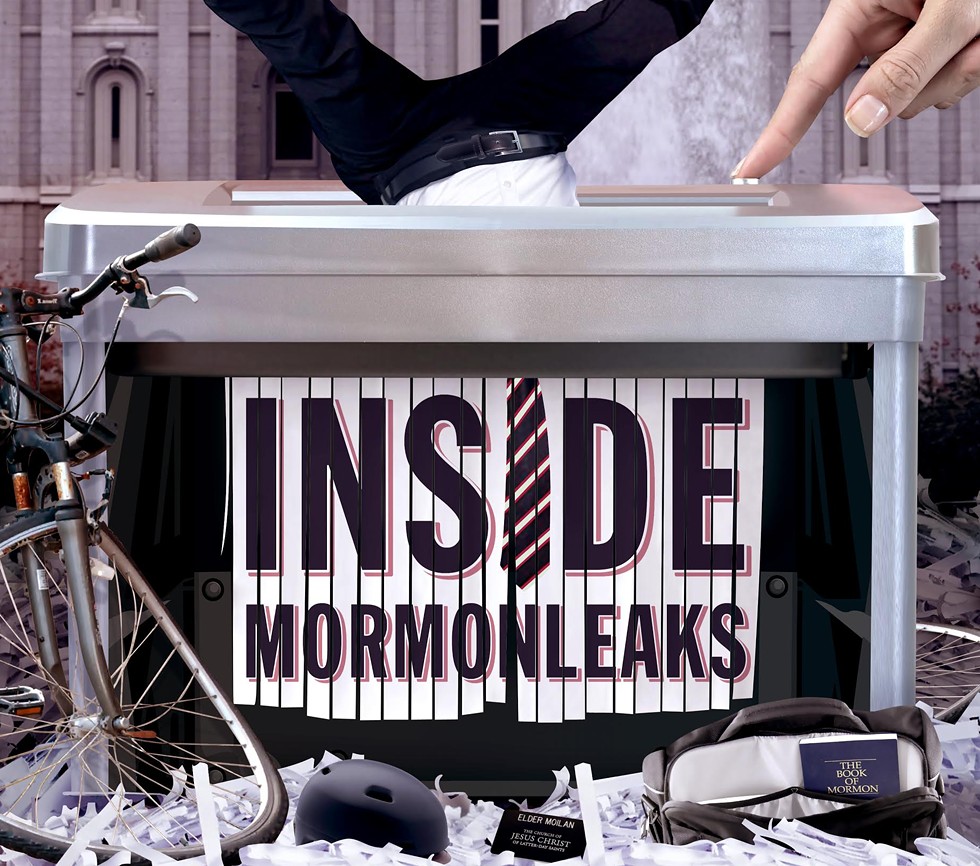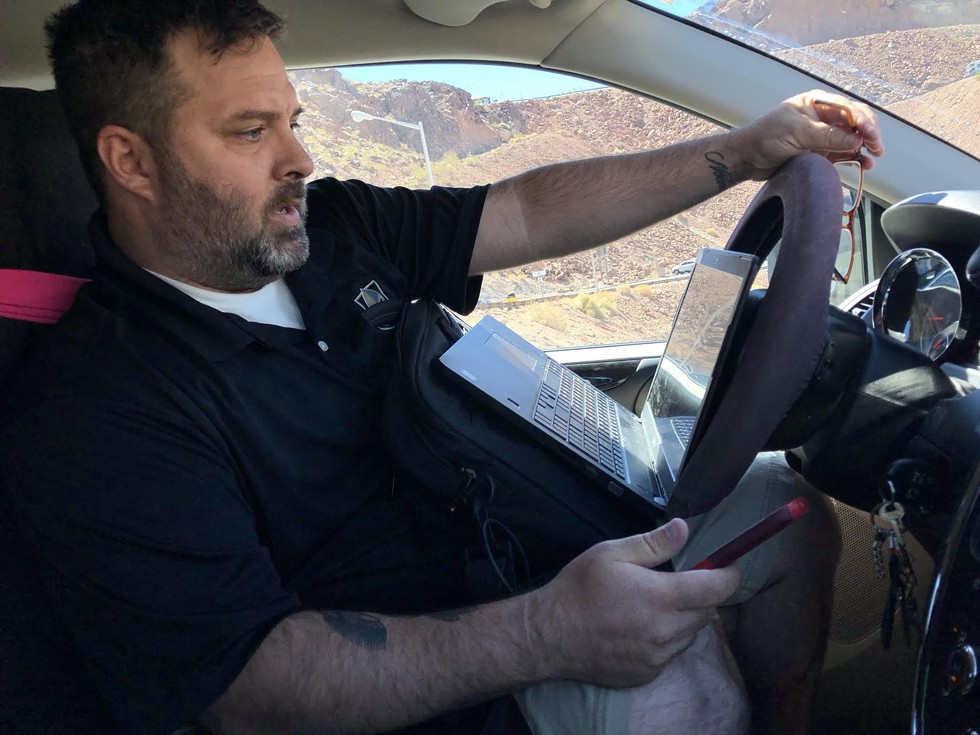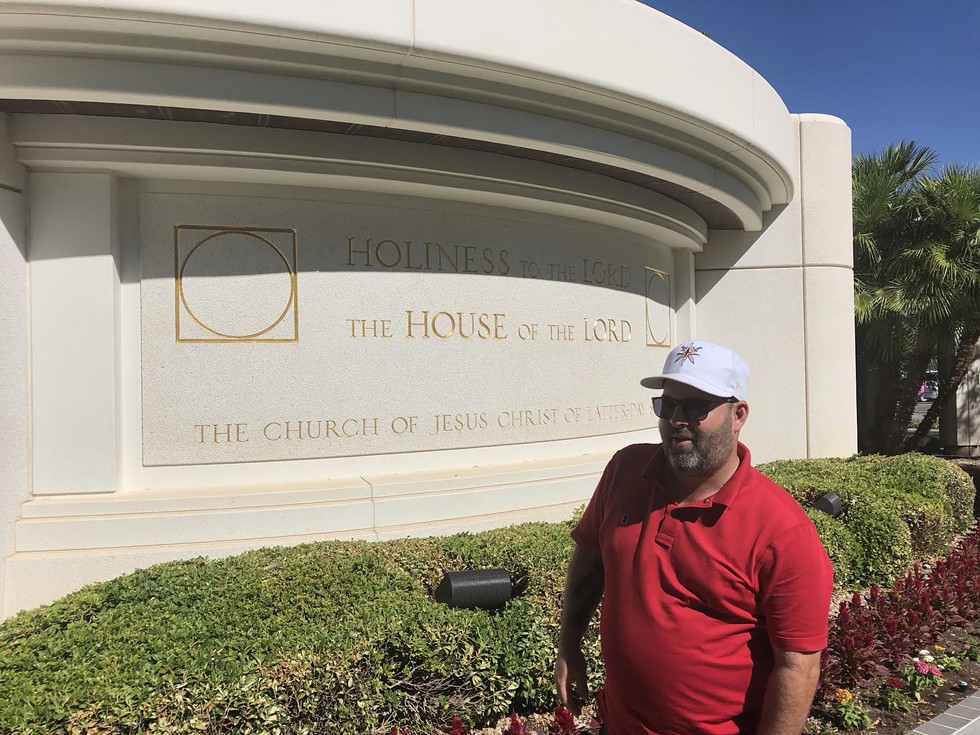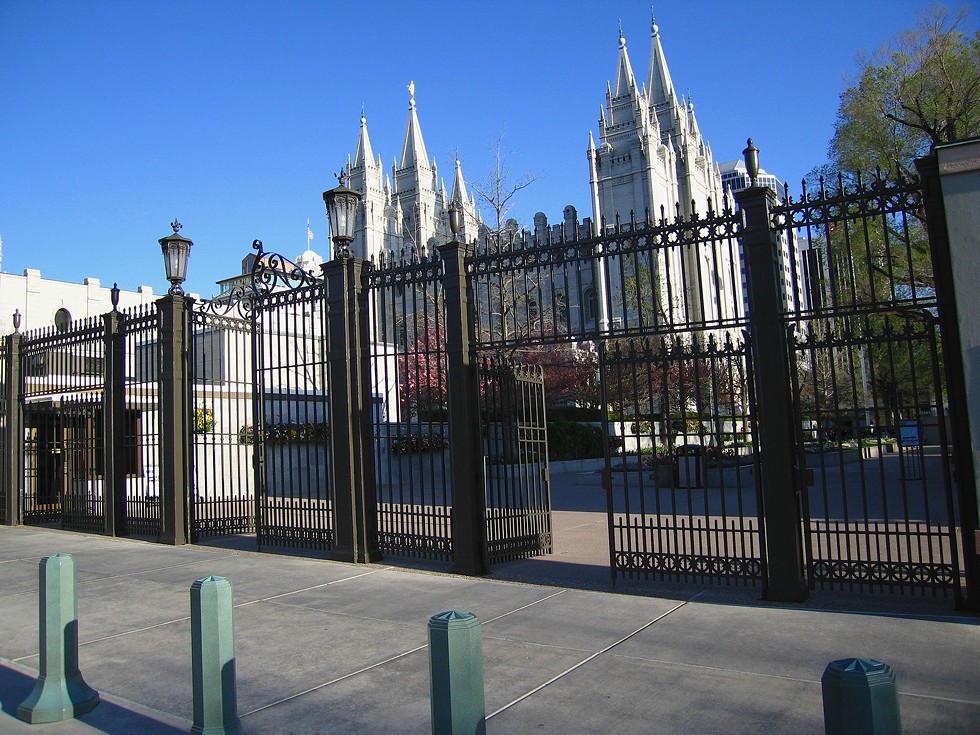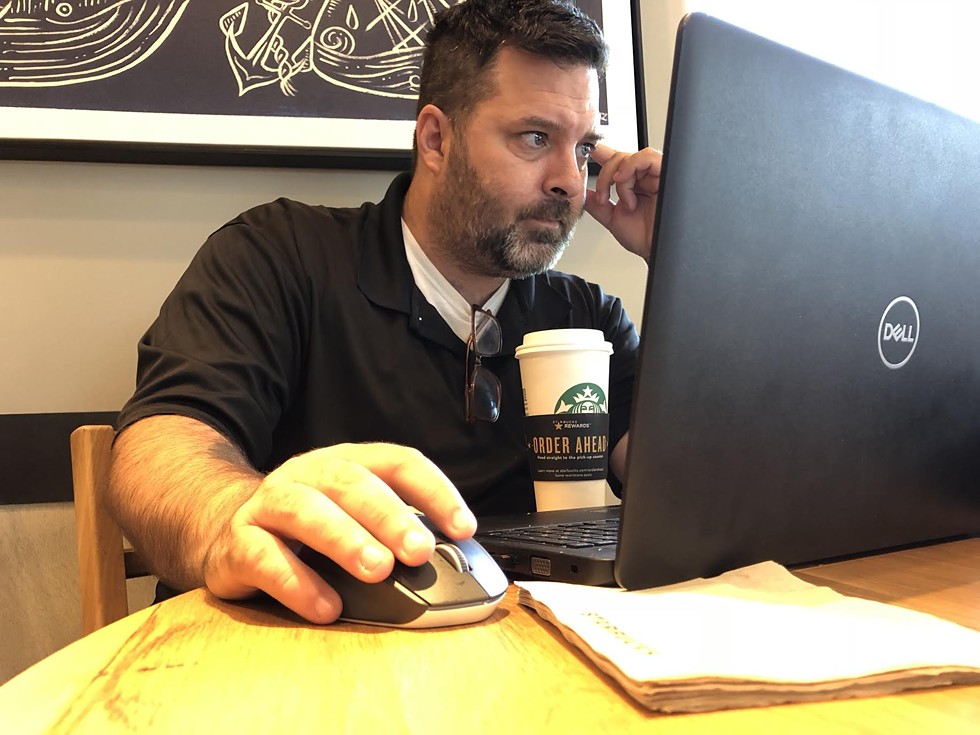Year
The black Dodge Caravan zigzags down scorching Black Canyon and crosses over Hoover Dam into Arizona, a glorious one-party consent state where Ryan McKnight, a 37-year-old scruffy, tattooed ex-Mormon, won't have to ask for permission to record his phone calls.
"I'm just doing it out of an abundance of caution," he says, pulling into a parking lot on the Arizona side of the iconic engineering marvel. He explains he's unsure if he'd be allowed to record the telephone conversation he's about to make were he at home in neighboring Nevada. (He wouldn't have.)
McKnight, who lives in a Las Vegas suburb and on a near-daily basis wears apparel that touts the city's new professional hockey team, the Golden Knights, is the founder of MormonLeaks, an organization that advocates for more transparency within The Church of Jesus Christ of Latter-day Saints by vetting and publishing sensitive documents sent in by whistleblowers. According to its website, MormonLeaks' mission is based on "the belief that increased transparency within the Mormon Church results in fewer untruths, less corruption and less abuse within Mormonism."
Much has been building toward this brief interstate trip: receiving documents and emails alleging recurring sexual abuse between a high-ranking church official and a then-14-year-old girl in 2009; redacting identifying information of the survivor and her alleged abuser; sitting in a local coffee shop with a laptop—screen facing the wall, to ward off wandering eyes—and organizing the telephone numbers to call once in Arizona.
"I'll be honest with you, I get nervous making calls like this," McKnight says after parking the van and taking out his laptop.
"I only need them to confirm there was an accusation," he says. "That tells me enough to believe it's real." Then he dials.
Typical Mormon Life
Before MormonLeaks, before the pointed emails from people who disagree with its cause and before the crusade for transparency, the McKnight family—all six children and their parents are members of the LDS Church—moved throughout the U.S. and South America every two years or so because Ryan's father, a CIA employee, kept getting transferred. "We were practicing Mormons; lived pretty much a typical Mormon life," McKnight says. "Las Vegas is the most Mormon place I've ever lived. Everywhere else, the Mormons have been an afterthought."
Ethan Gregory Dodge, who works closely with McKnight on the website from his home half a country away, grew up in Provo and was also a practicing Mormon. "Everyone you knew and associated with was also Mormon," Dodge, 27, says of his hometown. "If you didn't do what you were supposed to do, everyone knew."
The two men have spent the majority of their lives in the LDS Church, but they both started to question their faith around the same time.
In 2013, McKnight came across online items that challenged what he'd been taught during his formative years. "You just kind of go down this rabbit hole, and you find out that the narrative you've been taught your entire life does not match up with what took place," McKnight says. "It's the whitest of whitewashing that I've ever seen."
What cut deepest, McKnight recalls, were issues revolving around the historicity of the Book of Mormon, institutionalized racism he hadn't previously comprehended and Joseph Smith's documented coupling with young women. "The marrying the teenage brides bothered me, but what bothered me even more was the fact that I went 32 years without knowing," he says. "It was almost like the cover-up was worse than the crime." That revelation prompted McKnight's resignation from the church the following year.
Dodge started questioning his own affiliation in 2014 after he found out his mother had left the religion. "It was difficult for me because when my mom left, I really had to think about what I believed," Dodge says. "Then I started thinking about the shame and guilt I experienced [growing up], and whether I wanted my kids to experience that."
In the years that followed, Dodge further read up on the church's history and studied its sacred text. "I felt pretty betrayed," he says of his reaction to the historical discrepancies between what was true and what he'd been taught, and relayed to others during his mission to Guatemala. "What broke my shelf," Dodge says—referencing a common saying among Mormons who question their faith and are told by leaders to, in Dodge's words, "put that book up on a shelf and we'll deal with it later"—was primarily that culture of shame, Smith's magical and superstitious worldview, the church's apparent whitewashing and how the Book of Mormon was translated.
In 2016, he formally distanced himself from the church. "People don't leave the church for the reasons that the church typically pegs them for leaving," Dodge says of the stereotypes some active Mormons might have of those who stray: lazy people tempted by the devil, salivating to sin. "In reality those kinds of excuses are so insulting to those of us who have left the church because it completely writes off and discounts our entire journey, which to me was the hardest thing I've ever done in my life."
No longer identifying as Mormon, both men now utilize the expertise they've honed in their professional lives—McKnight as a former agent with the Nevada Gaming Control Board and audit supervisor with the Nevada Department of Taxation; Dodge as a cyber security and digital forensics specialist for a private company—to run MormonLeaks and ensure the identities of their sources remain anonymous, often even to them. "We have no way of knowing who these people are who are sending us these documents, unless they go out of their way to tell us," Dodge says.
"It was just a natural extension of my personality and expertise," McKnight says of founding the portal and his experience in holding Nevada casinos accountable when he was a state auditor. "Most people, especially Mormons, think I'm some angry ex-Mormon in a basement who saw an opportunity to hurt the church. That's not even close to what happened."
Hit and a Miss
Back at the Arizona parking lot, McKnight's calls aren't going well. First, he phones the current president of the mission where the survivor alleges the sexual abuse first took place. "It's kind of a private matter about one of the sister missionaries," McKnight tells the person on the other end of the line—hoping this phrasing will get him a call back from the mission president.
Next, he dials an overseas LDS office, looking for one of the two members of the Quorum of the Seventy who were involved in the initial abuse investigation. The international calls don't go through.
"I have very little confidence in this number, unfortunately," McKnight says of the next call: the accused, a former mission and temple president who'd been a patriarch—someone who is ordained to give special blessings—at the time of the alleged abuse. He calls two numbers, neither of which connects him to the right person.
Lastly, McKnight tries a couple of numbers he believes are connected to the mission president first told of the abuse allegations last year. The calls don't go through.
Waiting on a callback, McKnight gets out of his car and takes in the spectacular view of the Hoover Dam. He talks about the dam's history, how security around it has changed following 9/11 ("None of this used to be here," he says, pointing at barriers erected to keep cars from driving onto the sidewalk) and how he and his wife of 15 years want to take their four children back to the Grand Canyon. Then, McKnight's phone rings: it's the first mission president he called—the one who took over the mission following the allegations.
McKnight recounts the allegations—how they'd been reported before the official's time there. Maybe an investigation had commenced once he took over, he inquires. "You telling me about it is the first I've ever heard," the mission president says over the phone.
Disappointed, McKnight runs through the possibilities. Maybe the investigation had been concluded before this mission president took over. Perhaps he hadn't been briefed on the investigation. "And he could be lying through his teeth," McKnight says. "It doesn't tell me it's not real."
He then dials his partner Dodge—the two have only met in person twice, primarily communicating over the internet or phone—to tell him about the call. "There was no obvious tone in his voice that implied he was lying," McKnight says. The pair discuss their remaining options—who else to call, who to contact as a last resort if they can't confirm the allegations. They decide the leak won't be published the next day, as originally planned. If they're going to publish, they agree, they'll need harder evidence.
This is not the first time such accusations have rung inside the church. In March, MormonLeaks released audio and a transcript of Joseph L. Bishop, former president of the Provo Missionary Training Center, admitting to inappropriate actions he had with female missionaries. In response, church hierarchy released a statement saying in part that "If the allegations of sexual assault are true, it would be a tragic betrayal of our standards and would result in action by the Church to formally discipline any member who was guilty of such behavior, especially someone in a position of trust." It added that "sexual abuse cannot be tolerated in the Church."
The LDS Church declined a request to comment or be interviewed for this story.
Awake, Ye Leakers, Awake
McKnight's first leak was well before MormonLeaks ever materialized. In November 2015, he was active in Facebook groups and an ex-Mormon subreddit where he'd post his thoughts and feelings. "I was still pretty much very self conscious—the fact that I had left the church," McKnight says.
That month, McKnight saw someone post in a Facebook group about the now infamous "November Policy," which, among other things, makes apostates of married same-sex couples and bans their children from certain religious privileges. McKnight's instinct was to publish the text on Reddit and another Facebook group. It spread like wildfire.
"I didn't realize that I stumbled across this amazing new policy that was quietly being released," McKnight says. "I wasn't trying to leak it, though. I didn't even know what I was doing."
John Dehlin, founder of the Mormon Stories podcast, reached out to McKnight after the post went viral. McKnight helped connect Dehlin with the person who'd originally posted about the policy on Facebook, after which Dehlin took the information to the media. Later that night, McKnight recalls, Dehlin publicly thanked him on Reddit. "Because John made that post," McKnight says, "I became known as 'The Leaker.'"
From then on, leaks started landing on McKnight's lap about once a month. Almost a full year later, he created the YouTube channel titled "Mormon Leaks"—"I made it up on the spot," McKnight says—so he could publish 15 leaked videos. They showed, among other things, church officials talking about whether Chelsea Manning was a "confirmed homosexual" and that former Sen. Gordon H. Smith, R-Oregon, had voted in favor of the Iraq War, in part, because he thought it would be an opportunity for the LDS Church to send missionaries there. "That is really what made everything national news," McKnight says; The New York Times ran a story quoting McKnight, calling him "the conduit—but not the source—for the leaked videos."
After the wave of publicity, McKnight continued to be bombarded by potential leakers claiming to have information. "I had to piss or get off the pot," he says. "I had to either go all-in on this or have to be like, 'Hey guys, this was fun, but I have other stuff to do.'"
That momentum ended up connecting Dodge and McKnight. The cyber security expert contacted McKnight after hearing him talk on a podcast about how he'd gotten the videos, leaving him concerned over the whistleblower's anonymity. "The source was leaving digital fingerprints all over the place," Dodge says. After reviewing several résumés, McKnight chose to work with Dodge to ensure anonymity and protection of MormonLeaks' sources.
The pair formally launched the website just before the end of 2016. Originally called "MormonWikiLeaks" because someone already was using the mormonleaks.com domain, the site got a good amount of attention, even before they had any leaks to publish. Administrators managing the WikiLeaks Twitter handle asked McKnight to remove the "Wiki" from their title, McKnight says, which they did the following month, when they published apostle Henry B. Eyring's paystubs from the year 2000, as well as three other documents.
"We disclosed something that never in the history of the Mormon Church had been disclosed," McKnight says of that leak. "We got all kinds of media coverage."
That spark showed McKnight he was onto something important. "If our content can open people's eyes to the fact that, 'Wait a minute. Maybe the LDS Church isn't as transparent as we thought they were,' that can lead to really meaningful discussions," he says. "There's so many different facets to the power that this information places in a person's hands."
Call Me Maybe
Hours after the string of Arizona phone calls, after the sun sets and Las Vegas neon glows in the northwestern sky, McKnight is home and reenergized. "There's been a development in the case," he tells me over the phone. "We might have to publish tomorrow after all."
McKnight says he sent a Facebook message to the alleged abuser several weeks earlier, asking to set up a time to talk and the man had just accepted his message request.
"What are we going to do here?" McKnight writes after seeing the message had been read. "Should I assume a no-comment from you? Would you prefer to respond tomorrow?"
Minutes creep by as McKnight waits for a response. It was a Hail Mary, McKnight had mentioned earlier, "a crapshoot."
Finally, the accused responds. "He said he'd talk to me tomorrow," McKnight says, pushing the leak's publishing date by at least a few days.
The cloak-and-dagger mission continues the following morning at 5 a.m. White chocolate mocha in hand at a Las Vegas Starbucks west of the Strip, McKnight gets a Facebook message written in Spanish: "About the situation you're referring to, I can tell you that I didn't do anything to this individual," the message reads. "I never abused anybody."
McKnight immediately responds.
"According to the report we have, you told [an elder] that you didn't do anything and that you don't know why she would accuse you of these things. Is that your correct position?" McKnight asks.
Eventually, the alleged abuser says he'll talk to McKnight over the phone later that day. He never called.
Terrestrial Truth
Despite explosive buzz and continued media interest, McKnight isn't swimming in cash. When he isn't using his wife's van, he's driving a 1998 Honda Accord that doesn't have air conditioning, rendering it basically a sweatbox in the three-digit Nevada summer heat.
After receiving public input suggesting they should publish leaks from other religions, McKnight and Dodge founded the Truth and Transparency Foundation, which now houses MormonLeaks and FaithLeaks. Since December 2016, TTF and MormonLeaks have received about $16,280 in donations, McKnight says, which does not include the money he and others doled out to help get MormonLeaks off the ground.
McKnight says that because churches—LDS and other religious institutions alike—solicit donations with the intent to cover operating costs, they have an ethical obligation to disclose their financials. "The Holy Grail would be for the church to call me and say, 'We agreed to do this, to bring Deloitte in and do an annual audit, publish it, would you go away?' Yeah, let's talk," he says. "But that's not going to happen."
McKnight says the church has little to gain by fully embracing transparency, as ex-Mormons won't come back to the fold simply because of a more open accounting of how leadership spends its members' tithes. "Nobody left the church because of transparency. That might have been one bullet point in the list of 100," McKnight says. "They don't gain anything by releasing the cleanest set of books ever."
Plus, he says, if people find out the LDS Church has between $400 and $500 billion in total assets, as McKnight believes based on information from his sources, and sets aside about $40 million annually on charitable services, that discrepancy could sway those on the fence about leaving.
"It would be perfectly reasonable for a person to look at that and say, 'That's not acceptable, and I don't want to donate to a cause like that,'" McKnight says.
Transparency pipe dreams aside, McKnight says he's proud of the more informed conversations MormonLeaks has helped foster, and how the leaks he and Dodge have published have aligned with the group's—TTF, MormonLeaks and FaithLeaks—three pillars of transparency: finances, policies and statistics on sexual abuse cases, settlements and other legal cases.
In addition to being more thoughtful, engaged members of their religion, McKnight says Mormons can take those statistics on sexual abuse to leaders and ask what is being done, allowing church members to advocate for themselves and improve the Christian restorationist church from within. "You're paying for that with your tithing dollars," he says. "You're giving your money assuming they are going to be good stewards of your money."
Inevitably, with public prominence comes backlash. "We get a lot of nasty emails," McKnight says. No death threats, he clarifies, but they'll receive messages with "the filthiest, nastiest language in them," or long single-paragraph messages accusing them of being the devil.
"It happened a lot early on," McKnight says. "I think the longer we're around, the more seriously people take us."
A Continuing Crusade
Glen Feighery, associate professor at the University of Utah's Department of Communication, draws an obvious comparison to the similarly named, more controversial transparency website WikiLeaks. "MormonLeaks falls into this gray area: 'Wow, lots of information, looks credible, what do we do with it?'" he says.
Though similar in approach, McKnight is quick to disassociate from WikiLeaks. "We go to great lengths to redact names," he says. "They seem to not redact anything, and not really care about the unintended consequences of that action."
Recalling his time as a journalist, Feighery, who is not Mormon, says reporters would have to share their sources' identities with their editors, even if they were shielding said identities from the public for the source's protection. "We had to at least know who they were. Because if we didn't know who our source was, we had no way of judging their credibility," he says.
Not everything MormonLeaks publishes is from an anonymous source, but Dodge and McKnight both say that if someone sends them documents through SecureDrop, an open-source submission system that allows MormonLeaks to securely accept documents and communicate with their sources, the only way for them to learn the person's identity is if he or she willingly volunteers it. McKnight declines to talk about the additional methods he and Dodge employ to vet information, but says they look for "authenticity" and how the leak relates to their mission. He also points out they don't blindly publish everything that's submitted. "We're not a tabloid," McKnight says.
The challenging verification process—not knowing who their sources are—makes it hard to confirm the information MormonLeaks publishes. "That's the heart of the problem," Feighery says, "If they don't know where they got it, then how can any journalist come along and reconstruct?"
For his part, McKnight says he worries about publishing something that could potentially turn out to be false. "But even then," he says, "I'm confident in our process that that's unlikely to happen; and if it does, it would just be an honest mistake that we would have to deal with."
Despite his qualms, Feighery says he doesn't think MormonLeaks is bad. He says it could inspire younger Mormons to demand transparency within the church's ranks, and it could be an opportunity for media types to employ a little more transparency of their own. "It gives journalists an opportunity to say, 'This stuff is out there. Hey, public, I'm going to help you make sense of it,'" he says, meaning journalists can explicitly say, "This is what we can verify, and this is what we can't."
"It never hurts to have information presented to the public," Feighery says, carving out a caveat for so-called fake news. "Insofar as it appears that good, decent, smart people have looked at MormonLeaks and engaged in a conversation about it, that's a good thing," he says.
The Bullshit Meter
As of press time, MormonLeaks hasn't published the documents backing the patriarch's alleged sexual abuse of a minor. McKnight thinks the information is real, but he's missing irrevocable proof. "I need a little bit more than just my feelings on it," he says. "We haven't been able to verify it to the point where we're comfortable putting our seal of approval on its authenticity."
Previous sexual misconduct allegations and the perceived inaction of church leaders have led to calls for change, prompting the church to update its guidelines for preventing and responding to abuse and adopt new ones for interviewing youth. Sparks of reform, and using information to know whether reform is even needed, is what McKnight says keeps him motivated. "Awareness is power," he declares.
In the weeks ahead, while the two work their day jobs in opposite ends of the country, raise their respective kids and do their best to live normal lives in between, McKnight and Dodge will push forward, chipping away at confirming the most recent sexual abuse claims. McKnight acknowledges it can be tough to balance his truth-teller self with his family's needs—"I'm Mormon, man!" he jokes about his large brood—but he tries to limit the time he spends on his sleuthing endeavors to when his kids are asleep and his wife is at work. "I don't sleep," he says, explaining he usually goes to bed around 11 p.m. and is up by dawn.
"I still feel like we're doing something important," he says, "and something keeps telling me to keep doing it." The determination is fitting for McKnight, a self-described "no-bullshit kind of guy."
Asked how the information MormonLeaks releases can help current church members, McKnight's response is swift. "I can't tell you how many Mormons go throughout their lives without very many original thoughts, especially if it's something that's not fully in line with what they've been told in the past," he says. "It can help them break through—and I don't mean break through and leave the church—but just break through and have an original thought for once."
He doesn't know if he ever felt the need for something like MormonLeaks to exist growing up, but times—like attending church in a pre-Word of Wisdom cloud of tobacco smoke—change. "I wish that somebody, before the age of 32, had opened my eyes and explained the church is not as transparent as I thought it was," he reflects. Even so, McKnight's built-in BS detector, warped as it was back then, would have probably kicked in. "I would've assumed it was just a couple people rabble-rousing or making mountains out of mole hills," he says. "I purposely avoided reading anything negative."


